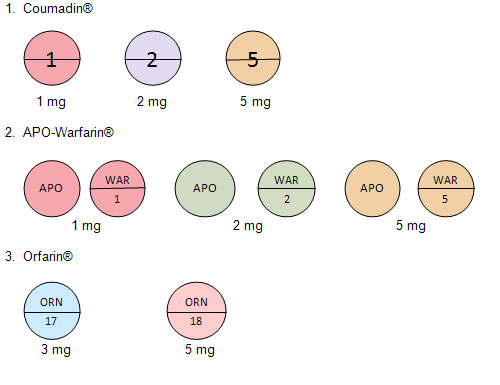What Is Warfarin?
Warfarin is a medicine used to prevent or reduce the formation of blood clots. It is also known as a blood thinner. Some products available in the market are:-

Why is Warfarin Needed?
Warfarin is used in patients who have problems or risks of abnormal blood clotting such as:
-
Atrial Fibrillation : Irregular heart beat
-
Prosthetic Heart-Valve : Replacement heart valve
-
Deep Vein Thrombosis : Blood clot in feet
-
Pulmonary Embolism : Blood clot in the lung
How Warfarin Acts in The Body?
Normally, human blood contains vitamin K which helps blood clotting and prevents continuous bleeding. However, in certain conditions blood clots may travel to vital organs such as the heart, lungs and brain that can cause blockage of the blood vessels and hence leading to heart attack or stroke. Therefore, the use of warfarin may help prevent the effect of vitamin K in the blood and prevent the blood clots from getting larger.
What is International Normalised Ratio (INR)?
INR reading shows the rate of blood clotting in the body. Warfarin dose depends on the targeted INR which should be within the recommended range. Normally, the desired INR range is between 2.0 to 3.0. Blood tests should be done regularly throughout the treatment period to monitor the INR readings.

How To Take Warfarin?
Warfarin should be taken on an empty stomach at the same time every day (usually at 6pm). Once missed, Warfarin should be taken immediately (within 8 hours). Do not multiply the dose!
What Factors will Influence INR Reading?
INR reading may be influenced by a few factors:
A sudden change in lifestyle and daily activities can cause unstable INR readings.
- Medicines/Supplements
-
Pain killer : Aspirin, Mefenamic Acid, Ibuprofen
-
Antibiotics : Erythromycin, Chloramphenicol, Ciprofloxacin
-
Antiepileptics : Carbamazepine, Phenytoin
-
Vitamin/Supplement : Vitamin C, E & K, Coenzyme Q10
-
Traditional/herbs : St. John’s Wort, Gingko, Ginseng, Green tea, Garlic.
Please consult your doctor or pharmacist before starting any medicines.
-
- Food consumption
-
Major changes in dietary patterns: Intake of foods that are high in Vitamin K: Green leafy vegetables like sawi, spinach, broccoli, cabbage etc., soy products, liver, green tea, cranberry juice.
-
Intake of foods containing Vitamin K should be consistent to avoid significant changes in the body.
-
- Lifestyle
-
Drastic change in physical activity
-
Alcohol consumption
-
Smoking
-
Side Effects
-
Bleeding
-
Bruising (skin appears bluish)
-
Rash
-
Nausea
-
Vomiting
-
Jaundice
When Will Treatment Be Needed?
Please contact your doctor if :
-
You have any of the following signs and symptoms of unusual bleeding:
-
* Bleeding from old wound
-
* Nose bleeds
-
* Non stop gum bleed after 30 minutes
-
Coughing and vomiting of blood
-
Unexplained bruising
-
Dark or bloody urine
-
Black or dark stool
-
Unusual menstruation or vaginal bleeding
-
-
You experience any of the following symptoms:
-
Difficulty in breathing
-
Chest pain
-
Swollen feet/Leg swelling
-
* This condition requires you to consult a doctor immediately
Things To Be Cautious Of
Remember :
-
Take Warfarin as being directed by doctors or pharmacists. Do not double the dose today if it was missed yesterday.
-
Do blood test as being directed.
-
Inform doctors or pharmacists on your current medication, traditional medicines, herbs and food supplement.
-
Maintain healthy eating habits and lifestyle, which is almost the same every day. Avoid sudden changes in diet and daily activities.
-
Inform doctors or pharmacists if you’re pregnant or planning to be pregnant.
-
Seek medical advice if you’re sick or experiencing unusual bleeding.
-
Inform doctor/dentist/pharmacist that you’re currently on Warfarin.
| Last Reviewed | : | 23 April 2014 |
| Writer | : | Nor Izyani bt. Hanafi |
| Accreditor | : | Azuwana bt. Supian |
| Reviewer | : | Che Pun bt. Bujang |







